A nation of immigrants: Dave Matthews speaks at Monticello
-
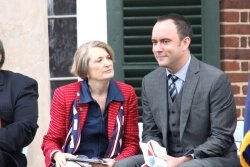 Musician Dave Matthews, with the president of the Thomas Jefferson Foundation, Leslie Greene Bowman.photo by Dave McNair
Musician Dave Matthews, with the president of the Thomas Jefferson Foundation, Leslie Greene Bowman.photo by Dave McNair -
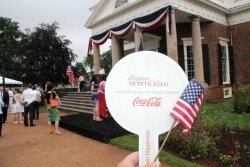 The Monticello Naturalization Ceremony, as American as apple pie... or rather, Coca-Cola.photo by Dave McNair
The Monticello Naturalization Ceremony, as American as apple pie... or rather, Coca-Cola.photo by Dave McNair -
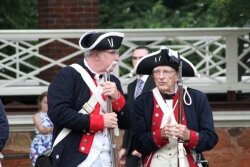 Members of the Virginia Society of Sons of the American Revolution.photo by Dave McNair
Members of the Virginia Society of Sons of the American Revolution.photo by Dave McNair -
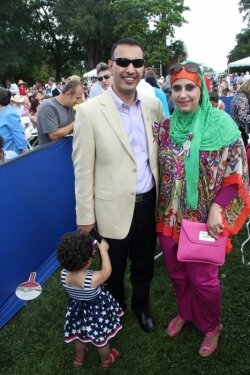 Originally from Baghdad, new U.S. citizens Haider Alsafee, his wife Zaimad, and their little girl.photo by Dave McNair
Originally from Baghdad, new U.S. citizens Haider Alsafee, his wife Zaimad, and their little girl.photo by Dave McNair -
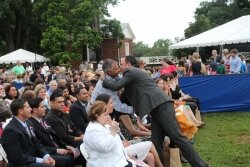 Dave Matthews walked off the stage when he recognized his friend, Hermano P. Freitas, among those receiving citizenship.photo by Dave McNair
Dave Matthews walked off the stage when he recognized his friend, Hermano P. Freitas, among those receiving citizenship.photo by Dave McNair -
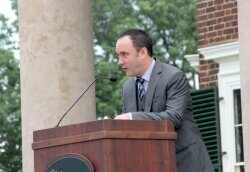 "We are a nation of immigrants," Matthews told the new citizens. "Our future history belongs to you as much as to anyone."photo by Dave McNair
"We are a nation of immigrants," Matthews told the new citizens. "Our future history belongs to you as much as to anyone."photo by Dave McNair -
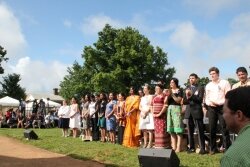 Ceremony participants stand to take the oath of citizenship.photo by Dave McNair
Ceremony participants stand to take the oath of citizenship.photo by Dave McNair -
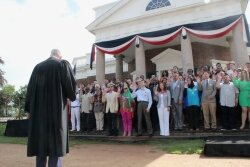 United States Bankruptcy Judge William F. Stone Jr. officiates the oath ceremony.photo by Dave McNair
United States Bankruptcy Judge William F. Stone Jr. officiates the oath ceremony.photo by Dave McNair -
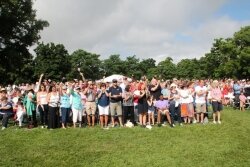 The large crowd on the lawn erupts with flag waving and cheers.photo by Dave McNair
The large crowd on the lawn erupts with flag waving and cheers.photo by Dave McNair -
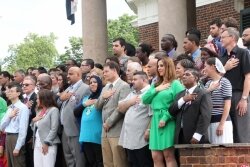 All 79 ceremony participants recite the Pledge of Allegiance for the first time as new citizens.photo by Dave McNair
All 79 ceremony participants recite the Pledge of Allegiance for the first time as new citizens.photo by Dave McNair -
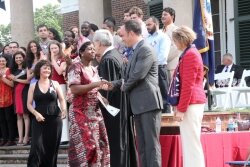 New citizens get their certificates of citizenship, and handshakes and hugs from The Dave.photo by Dave McNair
New citizens get their certificates of citizenship, and handshakes and hugs from The Dave.photo by Dave McNair -
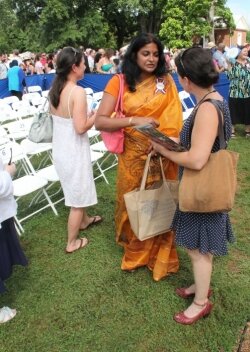 Suneeta Gupta, who was born in India, but now calls Charlottesville home, chats with a reporter.photo by Dave McNair
Suneeta Gupta, who was born in India, but now calls Charlottesville home, chats with a reporter.photo by Dave McNair
Like ants marching, hundreds suffered slow and crowded shuttle rides up and down Monticello mountain to attend the 51st Independence Day Celebration and Naturalization Ceremony at Monticello on July 4, with guest speaker, musician Dave Matthews.
The sold-out event, the longest running naturalization ceremony outside a courtroom, saw 79 people from 36 countries become U.S. citizens, bringing to 3,000 the total number of citizens naturalized at the home of Thomas Jefferson, the principle author of the Declaration of Independence, who, in proper form, also died there on July 4 in 1826.
Matthews, too, suffered a grueling schedule to attend. In a short text message, the rocker described feeling "a bit addled" when he threw on a three-piece suit early Thursday morning and headed up Monticello mountain to give his speech. He'd arrived in Charlottesville "pretty late" the night before after performing a show outside of Buffalo, New York, on the July leg of a 45-concert summer tour. Still, Matthews' family, as well as DMB manager Coran Capshaw, were in attendance.
Matthews, who immigrated to the U.S. from South Africa with his family in 1969, grew up in Charlottesville and later formed the Dave Matthews Band, which has sold more than 30 million records worldwide. Indeed, as Thomas Jefferson Foundation Board Chairman Donald A. King Jr. joked, Matthews' star has become so bright that they've been reluctant to conduct a poll asking people to name Charlottesville's most famous citizen, fearing it might not be Thomas Jefferson.
Matthews may not have been one of Monticello's most stately speakers, who have included Presidents Franklin D. Roosevelt, Harry S. Truman, and George W. Bush, but given his Charlottesville roots, his own immigration story, and his serious hometown-boy-done-good creds, it's a surprise it's taken so long.
"Dave Matthews was, to my mind, the perfect speaker, a son of not just Charlottesville or America but of the world," says Jasmin Darznik, an Iranian-born novelist who became a U.S. citizen on July 4. "For me, personally, the day was filled with joy but also an awareness of just how lucky I was to stand on those steps and finally take that oath of citizenship."
Matthews was quick to remind the new citizens that there have been many Americas— ones to be proud of, and ones to be not so proud of.
“There is the America of our forefathers who signed the incredibly important Declaration of Independence. And there is the America that enslaved half a million men, women, and children at the very time the Declaration of Independence was signed,” said Matthews. “Many of those who signed that document themselves owned slaves. Thomas, the great Thomas Jefferson, the brilliant Thomas Jefferson among them.”
Matthews also focused on Native Americans, who now call themselves Americans as well, but whose culture was decimated by the influx of settlers.
"We are a nation of immigrants," said Matthews. "Our future history belongs to you as much as to anyone. This is the America of jazz and the blues and rock ‘n' roll and the civil rights movement and putting a man on the moon and of the atomic bomb. This is the America of a complicated history."
Matthews also shared some funny and trying stories about his own experience becoming a U.S. citizen, describing how the immigration service lost his mother's papers when she was attempting to apply back in the 1970s, before digital back-up files. He also told a story about a friend of his who was seeking citizenship, and how the process was stalled when the friend was told that his fingerprints had expired.
"How do your fingerprints expire?" Matthews asked, cracking up the crowd. "I like bureaucracy... it just makes things funny after you're done," he added.
"[Matthews] interjected a necessary note of realism amid all the celebration and congratulations," says Darznik. "That meant a lot to me. The system is far from easy or fair, and in the end what separated me from the millions of other immigrants seeking citizenship in this country was luck."
To drive home some of his ideas, Matthews referenced language inscribed on the Statue of Liberty (getting a laugh when he assured the new citizens he was not calling them "wretched refuse"), as well as on the the Great Seal of the United States. In the end, he left the new citizens with the motto on that seal, E pluribus unum, the Latin phrase meaning "out of many, one."
"We may be many," said Matthews, spreading his arms, then holding up one finger, "but now, we are one."
7 comments
America didn't build the atom bomb the shadow government built the atom bomb. Don't come to my country and associate me with Hiroshima, Nagasaki, and underground testing. Don't come to my country to criticize the atom bomb and say nothing of the high altitude nuclear detonations that offgassed the upper third of Earth's atmosphere and then tell me I need to emit less carbon dioxide to save the Earth. And what's so great and brilliant about claiming ownership of over six hundred human beings? A person who praises that type of person should not have been welcomed into this country (not that we knew at the time). Maybe Matthews being sarcastic? A person who sarcastically lambastes this country's forefathers should not have been welcomed into this country (not that we knew at the time). I Guess he feels comfortable voicing these conflicting statements now that he has been welcomed into this country as a citizen and most people seem to like him. Don't come to my country and tell me we put a man on the moon when the Annunaki lazer beams would have annihilated planet Earth if we had even attempted to do so. And don't talk sideways into the microphone, stand up straight and tall.
If Dave had only opened up his grin for the photo he could have passed for a Halfaday
Wow, SKP, I am overwhelmed.
Might want to add another layer of tinfoil to your hat...
Oh, that's alright, mine is made of aluminum foil like everyone else's, and they're spraying enough layers of tinfoil into the air you breathe in plain view to hold in the ozone and block the particle beams
Leave it Dave to open a can of wormwood. (I know, it's Wikipedia but the real scientific cite was a PDF I couldn't open a can of)
http://en.wikipedia.org/wiki/High-altitude_nuclear_explosion
Gee, I wonder what would happen if we blew up the atmosphere with an atom bomb. Let's try it, and find out!